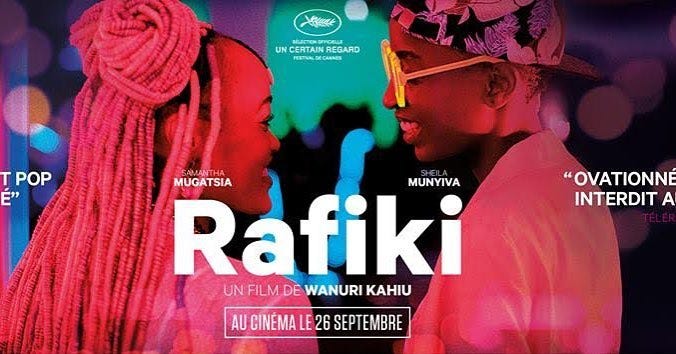
There’s nothing quite like watching a bubblegum pink movie about lesbians after a tiring day at school. Sure enough, on Tuesday, close to 50 students gathered in Pauli Murray’s Lighten Theater to watch the new queer Kenyan film, Rafiki, and talk with one of the lead actresses, Samantha Mugatsia. This event, sponsored by Yale African Students Association (YASA), marks the first time their annual African Week has incorporated queerness into their celebrations and discussion of African culture, politics, and identity.
The movie follows Kena, whose daily life of playing soccer, working at her father’s shop and hanging out with her friends is suddenly disrupted when she falls in love with another girl, Ziki. That their fathers are bitter political rivals, competing for election to the same post, further complicates a relationship already dangerous in a country in which LGBTQ people face intimidation and discrimination on a daily basis. Throughout the film, we see the relationship between Kena and Ziki blossom despite these conditions — but we also see it nearly destroyed under the threat of ostracism from their families and the violence that ensues when neighbors find them kissing.
There is a substantial lack of representation of African voices in the international film setting, and even more so when it comes to African films featuring queer and trans characters. It took the director, Wanuri Kahui, 11 years to make the film, seven of which were entirely spent searching for funding: clearly, there are serious barriers facing African filmmakers who are trying to tell the stories of LGBTQ folk in their own communities — not a topic the government or mainstream agencies are eager to support. Rafiki, which has gained international recognition (including a 10 minute standing ovation at the Cannes Film Festival), marks a huge achievement for the Kenyan film industry, for Kahui herself, and for queer Africans who can now see at least some version of their story reflected in film.
Back in Kenya, however, the picture is far from optimistic. In the post-film Q&A, Samantha Mugatsia admitted that she thinks her country just “isn’t ready for [the movie] yet.” Despite growing activism and resistance, Kenya still upholds the ban on gay sex established during British colonial rule, and people found “guilty” can be sentenced to up to 21 years in prison. Although the government lifted the ban on Rafiki for seven days to allow it to be screened at the Cannes Film Festival, it has been received with mixed reviews in its country of origin. When Mugatsia returned from touring abroad, the cast, crew and their friends set up a system of safe-houses to ensure that she and her co-leads were safe in their own cities. That said, she also described being constantly bolstered and moved by accounts from people in Kenya who saw the film and felt their own struggles reflected in the violence, pain, and love within the story.
For many students, Africa Week presents an opportunity to reclaim the image of their continent, to tell a story of the diaspora that reflects the diversity of cultures, experiences, and perspectives that are often flattened and not afforded the time and space they deserve, both at Yale specifically and in the West in general. Openly discussing experiences of queerness within this diaspora is part of YASA’s goal to support all groups in Africa and, through dialogue and connection, create an Africa that every member of the diaspora can claim as their own. After all, the title of this year’s Africa Week is, “My Africa Is: Mine.”
For LGBTQ people living and studying in the US, this film reminded us of the privilege and relative safety many of us have, while at the same time reaffirming the importance of continuing to advocate and fight for equality even after it seems that many battles in our own country are close to being won. For queer Africans, the film is part of a movement towards greater acceptance, marking an important precedent in bringing one particular story, in the midst of an incredible complexity and range of experiences, to light, in a place where it would’ve been easier to let it stay in the dark.
As a queer, black, trans person who advocated tirelessly for women’s, LGBTQ and civil rights, Pauli Murray would surely approve.
Tender, defiant, unmistakably African was originally published in The Yale Herald on Medium, where people are continuing the conversation by highlighting and responding to this story.
